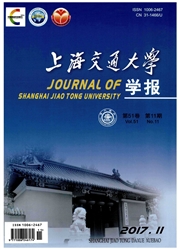

 中文摘要:
中文摘要:
提出了一种复杂度低的,应用于多输入多输出(MIMO)系统迭代接收机中的迭代可配置树型搜索(IRTS)检测方法.不同于最优的最大后验概率检测器对所有可能的发送符号向量进行完全搜索,该算法仅处理对检测器的软输出有较大贡献的符号向量.IRTS算法首先基于最小均方误差(MMSE)准则估计发送符号的可靠度;然后依据此可靠度对发送符号和信道矩阵进行排列来构造可配置的树型结构;并以该树型结构进行宽度优先搜索.在准静态信道条件下的仿真结果表明,即使在相对较小的搜索序列数目的情况下,IRTS算法也具有优越的性能.
 英文摘要:
英文摘要:
This paper is concerned with a reduced-complexity detection, referred to as an iterative reconfigurable tree search (IRTS) detection, with application in iterative receivers for multiple-input multiple-output (MIMO) systems. Unlike the optimum maximum a posteriori probability detector, which performs brute force search all the possible transmitted symbol vectors, the new scheme evaluates only the symbol vectors that contribute significantly to the soft output of the detector. The IRTS algorithm is facilitated by carrying out the search on a reconfigurable tree, which is constructed by computing the reliabilities of symbols based on minimum mean square error (MMSE) criterion and reordering the symbols according to their reliabilities. The computer simulation results prove the good performance of IRTS algorithm over a quasistatic Rayleigh channel even for relatively small list sizes.
 同期刊论文项目
同期刊论文项目
 同项目期刊论文
同项目期刊论文
 期刊信息
期刊信息
